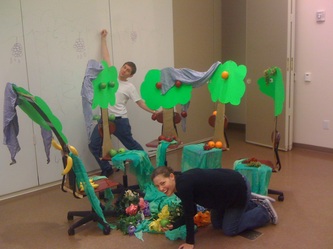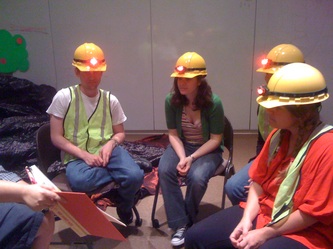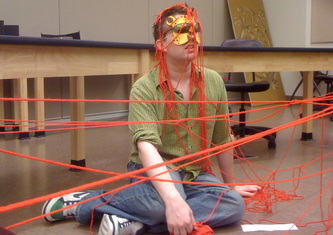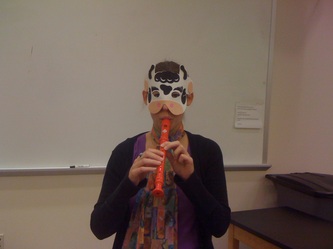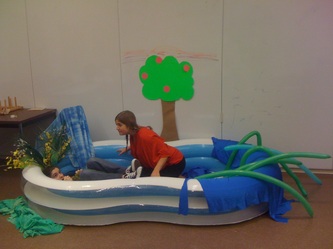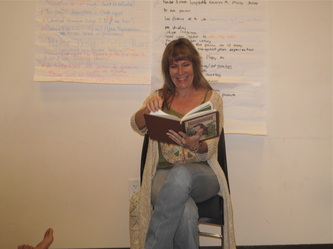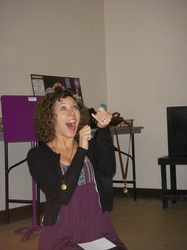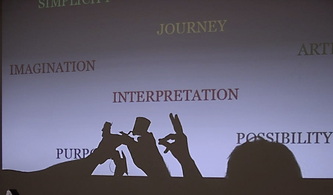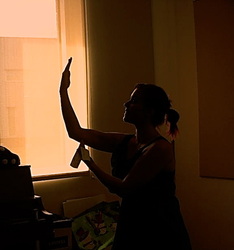Teaching Philosophy

As an educator, I am committed to cultivating active and engaged student-centered learning experiences that build self-esteem and self-awareness. I value creating art from a place of emotional honesty and exploring craft, self, and community from within safe space that fosters risk-taking. I prize equally both process and product, both meta-cognition and emotional awareness, and endeavor always to create inclusive, liberating, and celebratory environments that challenge students to develop, use, and integrate all of their abilities. I approach arts education in a holistic fashion, encouraging collaboration and co-creation, addressing the multiple intelligences, incorporating interdisciplinary arts, and mentoring, motivating and empowering not just the artist but the person. The arts possess inherent transformative possibilities and I encourage students to discover those possibilities and to create opportunities for change both inter-personally and within community.
The Art of Storytelling
In this class we examine, celebrate, and cultivate the natural human impulse to turn experiences into story and to share those stories with others. Much of this class involves telling stories (personal, cultural, tandem, healing), responding to the stories of others, and strengthening the tools of the storyteller’s trade (voice, gesture, movement, rhythm, timing, dialogue, audience involvement, etc.) Together, we explore storytelling as a creative art, cultivate an appreciation for the enormous range and depth of story from mythic to ethnic, and come to appreciate that we are all storytellers with the potential to become even better ones.
Acting
The study of the principles and techniques of acting and the process of discovering and developing your craft from the inside out. Emphasis will be placed on character development and building a scene. We come to the theatre not to hide behind a mask but to reveal that which lies beneath it, accordingly, much of your work here will involve self study, self reflection and self evaluation. YOU will be at the center of this learning experience. If you are ready, willing and able to take risks, make mistakes and co-create a safe, honest, and nurturing environment in which to hone a craft and feed your creative spirit – welcome home. Bring with you an open mind and the desire to learn and grow. Rooted in Stanislavski, Meisner, and Viewpoints.
Theatre for Social Change
Theatre for Social Change has far-reaching implications. It can be used as a teaching tool, a vehicle for self-study, as a problem solving technique for groups of any size, and as community building. Those who have expertise in this area will be equipped to facilitate social change using the medium of theatre in a variety of venues; thus enhancing their abilities as artists, educators and catalysts for positive human growth. This course is primarily a studio class exploring the theatrical techniques inspired by the work of Augusto Boal: forum theatre (in which spectators explore their own solutions to collective problems by intervening at the crisis point of a scenario), image theatre (a techniques that focuses on physical expression, providing an alternative form of communication not reliant on language), and rainbow of desire (a body of therapeutic techniques geared toward the individual). We will also explore devising within community a la Michael Rhod, and Playback Theatre, the spontaneous re-enactment of personal experience honoring the dignity, drama and universality of all our stories.
Methods of Teaching Drama
This course includes interactive improvisational workshop experiences, participation, leading/facilitating, discussions, reflections, and observations. This class requires high quality, thoughtful evaluation of your own and the work of others, group work, discussions and presentations, and group meetings and planning with peers outside of allotted class time. Basic materials, techniques, and theories for facilitating improvisational drama with children and youth.
Creative Processes: Theory and Practice
In this course in creativity students will explore/recover/discover and share their creativity. Based on the principles that:
1) Creation is the natural direction of life.
2) We are all artists.
3) Expressing our creativity is fundamental to our health and happiness.
4) Sharing our creativity, in turn, inspires others.
5) Cultivating a “creative” approach is beneficial in all areas of life.
This guided exploration we will raise, celebrate and actualize the creative power that runs through all of us. This class a collective, a creative cluster if you will; though the Instructor will serve as facilitator, if there is an emissary, it is the work itself.
Sample Assignments: Power Masks, Emotional House, Identity Detective, Morning Pages, Creativity Monster, Artists Dates, Toxic Relationship Collage.
Inspired by Julia Cameron's "The Artist's Way."
1) Creation is the natural direction of life.
2) We are all artists.
3) Expressing our creativity is fundamental to our health and happiness.
4) Sharing our creativity, in turn, inspires others.
5) Cultivating a “creative” approach is beneficial in all areas of life.
This guided exploration we will raise, celebrate and actualize the creative power that runs through all of us. This class a collective, a creative cluster if you will; though the Instructor will serve as facilitator, if there is an emissary, it is the work itself.
Sample Assignments: Power Masks, Emotional House, Identity Detective, Morning Pages, Creativity Monster, Artists Dates, Toxic Relationship Collage.
Inspired by Julia Cameron's "The Artist's Way."
Dramatic Literature for Children
This course will provide an in-depth study of the growth and development of dramatic literature for young audiences. The over-riding arch of this class will be developing and articulating your own aesthetic. Aesthetics is a branch of philosophy dealing with the nature of beauty. The word aesthetic can be used as a noun meaning "that which appeals to the senses." In this case, that which appeals to your senses. Aesthetics can also be thought of as a system of criteria used for evaluating works of art. Criteria may be visual, moral, social, or any combination of these. The term may also refer to the quality of beauty that defines or is perceived in a work of art.
Developing your own aesthetic will require self-examination, the willingness to change your mind, and tolerance for the beliefs of others.
Developing your own aesthetic will require self-examination, the willingness to change your mind, and tolerance for the beliefs of others.
